Donald Trump

The fight to save the planet isn't over yet, but it will look different under Trump. Can Christians lead the charge?

With Trump’s blessing, Elon Musk’s Department of Government Efficiency has created an unprecedented crisis at an agency that oversees lifesaving assistance to some of the poorest and most vulnerable people in the world. Despite issuing limited humanitarian waivers, the administration has frozen nearly all new foreign assistance funding for the next 90 days, fired many senior leaders, and put the entire agency’s staff of more than 10,000 people on leave, two-thirds of whom work in field locations around the world.

Trump's barrage of executive orders, policy decisions and campaign appointments is overwhelming in its extremism. It is designed to provoke a feeling of panicked helplessness among those who oppose his plans for immigrants, LGBTQ+ people, and other targets of his vision for our country. But we do not have to give Trump what he wants and, by staying rooted in our faith, can undermine his campaign of shock and awe.

A favorite movie of mine growing up was the 1999 cartoon Our Friend, Martin. It combines two of the subjects I love most: time travel and Martin Luther King Jr. The main character, Miles, a Black sixth grader, visits the childhood home of King and ends up traveling back in time to meet King at various stages of his life. Miles, who was largely unaware of King before time traveling, eventually learns that King was assassinated. In order to prevent this, Miles convinces his new friend Martin to come to the future with him. And while that decision spares King’s life, the movie makes it clear that Miles saving his friend’s life would prevent the racial equality we now enjoy in the U.S.
In the modern U.S., are we really enjoying a post-King racial equality?
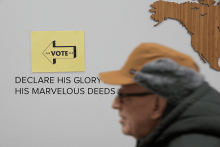
As countless Christians have expressed their disappointment with the results of the presidential election, many have heard in response platitudes such as “God is still on the throne” or “God is not Republican or Democrat.” Zach Lambert has heard those messages before. But as lead pastor of Restore Austin, he and his Texas team took a different approach. Instead of trying to “turn eyes heavenward,” his team worked to remind their church that God was with them in their grief and struggle.

SEEING THE RISE of right-wing populism globally, several months ago I began to lead scenario-planning and writing about what might happen if Donald Trump won. I played out strategies for how folks might meaningfully respond. Yet when he won, I still found myself deep in shock and sadness. In the days after, I reached out to my community to try to assess and get my feet back underneath me.
Being grounded is difficult when the future is unknown and filled with anxiety. Trump has signaled the kind of president he will be: vengeful, uncontrolled, and unburdened by past norms and current laws. If you’re like me, you’re already tired. The prospect of more drama is daunting.
As a nonviolence trainer working with social movements across the globe, I am blessed to have worked with colleagues living under autocratic regimes to develop resilient activist groups.
My colleagues keep reminding me that good psychology is good social change. For us to be of any use in a Trump world, we must pay attention to our inner states, so we don’t perpetuate the autocrat’s goals of fear, isolation, exhaustion, and constant disorientation. As someone raised by a liberation theologian, I’m reminded of how we lean hard on community and faith in tough times.
In that spirit, I offer some ways to ground ourselves for the times ahead.

TRUE CONFESSIONS: WE hoped this issue of Sojourners might be commenting on the first woman U.S. president. It would have felt like progress to see Kamala Harris, a woman of Black and South Asian heritage, in conversation with other female heads of governments, such as those in Mexico, Peru, Italy, Thailand, and Tanzania. We also planned for election results that would take time to finalize. Then, just days before our deadline, Donald J. Trump won the election — and by Electoral College votes it wasn’t even close. We feel weary and defeated. Like many of you, we worked hard to protect voters’ rights to a free and fair election. We trust that’s what we got. But the results have also moved a well-funded authoritarian movement closer to its goals, as journalist Katherine Stewart explains in our interview with her. This anti-democratic movement has hijacked parts of our Christian faith. We say it here plainly: The principles, methods, and policies of white supremacy and authoritarianism are incompatible with the message of Christ. As senior editor Rose Marie Berger writes, “The new authoritarians amassing around Trump see themselves as Nietzsche’s ‘supermen’” — superior to all others and with an immoral drive to dominate, not democratize. We will undermine them with revolutionary love every step of the way.
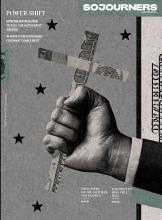
An interview with Katherine Stewart, author of Money, Lies, and God: Inside the Movement to Destroy American Democracy, alongside 10 ways to ground ourselves for Trump’s second term.

Concession speeches can reveal a glimpse of a politician’s soul, a rare look behind a curated facade. All they have poured their life into, with boundless ambition, hope, and relentless energy, has been lost. They are laid bare, vulnerable. And their words now don’t have to be calculated or pretested by a focus group.

My 8-year-old came downstairs with tears in his eyes after learning the news today.
“What will happen to the turtles?” he cried. He has been haunted by Trump’s words at the Republican National Convention, as he shouted “Drill, baby, drill!”
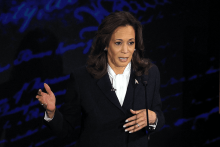
As Vice President Kamala Harris and former President Donald Trump discussed abortion policy during their first debate, Harris vigorously defended her vision for federal abortion rights. While she did, she returned to a talking point meant to appeal to religious voters.
“[Under Trump’s abortion bans] a survivor of a crime — a violation to their body — does not have the right to make a decision about what happens to their body next. That is immoral,” Harris said, before connecting morality and faith. “And one does not have to abandon their faith or deeply held beliefs to agree: The government, and Donald Trump certainly, should not be telling a woman what to do with her body.”
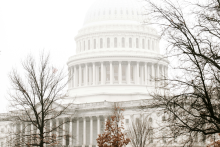
First unveiled in April 2023, and endorsed by more than 100 conservative organizations, Project 2025 is a 922-page document that serves as a to-do list for the next conservative president to accomplish. Activists, journalists, and many religious leaders have been warning the public for months about what they see as some of Project 2025’s more extreme policy proposals and the ways in which the blueprint would push our nation toward autocracy and Christian nationalism.
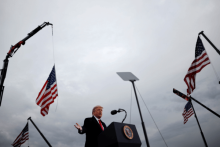
According to recent polling from the Washington Post and the University of Maryland, Republicans are now “more sympathetic to those who stormed the U.S. Capitol and more likely to absolve Donald Trump of responsibility for the attack than they were in 2021.” The same polling found that Americans were now slightly less likely to believe that President Joe Biden’s win was legitimate and more likely to believe there was “solid evidence” of voter fraud.

In a televised interview this week with Sean Hannity of Fox News, former President Donald Trump initially refused to answer the question of whether, if elected in 2024, he would be a dictator or use his power to seek retribution for his political opponents. After Hannity pressed further, Trump said he would only be a dictator on “day one” of a new presidency; he did rule out political retribution. This should be shocking, but are any of us surprised? Trump is known for his lying and exaggeration. Nevertheless, we make a grave mistake if we don’t take Trump’s words seriously.
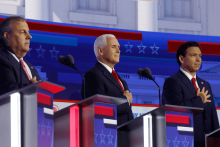
While there are some extreme politicians like Rep. Marjorie Taylor Greene (R-Ga.) who proudly claim the label, it’s unlikely the top Republican presidential candidates will explicitly embrace Christian nationalism by that name. Instead, voters in the 2024 election will need to be on the lookout for how candidates’ behavior and rhetoric aligns with Christian nationalist ideals and anti-democratic beliefs. Or as Jesus put it: “You will know them by their fruits” (Matthew 7:16).

Lisa Montgomery, the first woman killed by the U.S. federal government since 1953, was executed under former President Trump.
Red roses blooming all at once
when she finds between herself and any door
a male, be him grandson or lawyer, any flinch of any him brings a springtime
terror of thorn and attar, shivering with adrenaline, a clawing
of petal-flesh, the past beneath it, the blood
un-forgetting,
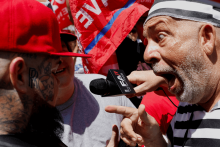
But while we disobey unjust laws to obey the moral laws we have been given by God, there’s a flip side: When human laws do serve the common good or restrain evil, we should obey them.
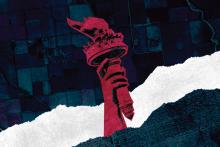
WHEN WE LOOK at the record numbers of migrants who are seeking refuge and asylum in the U.S. and the deplorable ways they have often been treated, it’s easy to lose faith. The U.S. immigration system seems so hopelessly broken, and hateful rhetoric and bad faith are so abundant among our politicians, that it can often feel as if there’s nothing we can do to fix it. Yet, if we take seriously both the Hebrew scripture command to welcome the stranger and Jesus’ call to treat migrant people as we would treat him (Matthew 25), then we cannot let ourselves succumb to despair or resignation. People who have been forced to leave dangerous conditions in their home countries to seek asylum are depending on us to not give up fighting for a fairer and more humane immigration and asylum system. Sadly, Congress has lacked sufficient political will to pass the sweeping overhaul of our immigration laws that is so sorely needed.
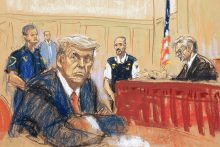
On Maundy Thursday of Holy Week, we remember how Jesus and his disciples celebrated the Passover meal, transforming it into what we now celebrate as communion. The word “maundy” originates in the Latin mandatum, in reference to the mandate Jesus gives his disciples that night: “A new commandment I give unto you that you love one another” (John 13:34). Just before the meal, Jesus engages in an act of loving service and humility: washing the disciple’s feet.
This selfless act contrasts sharply with the shameful spectacle that has dominated recent news: the indictment and arraignment of former President Donald Trump.
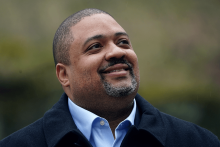
Manhattan’s District Attorney, Alvin Bragg, is best known these days for leading the probe of whether former president Donald Trump and his company broke state laws in 2016 to buy Stormy Daniels’ silence about an alleged affair.